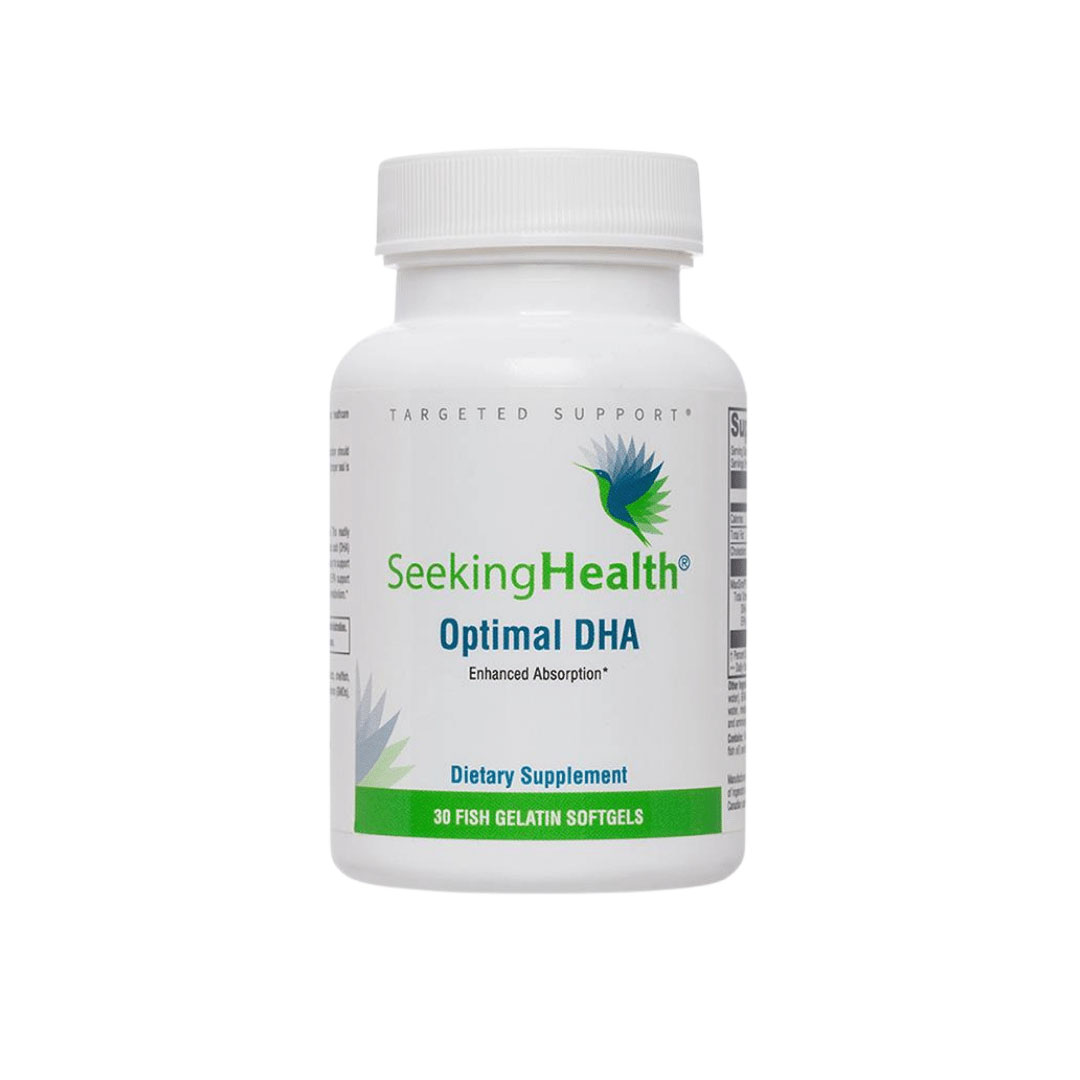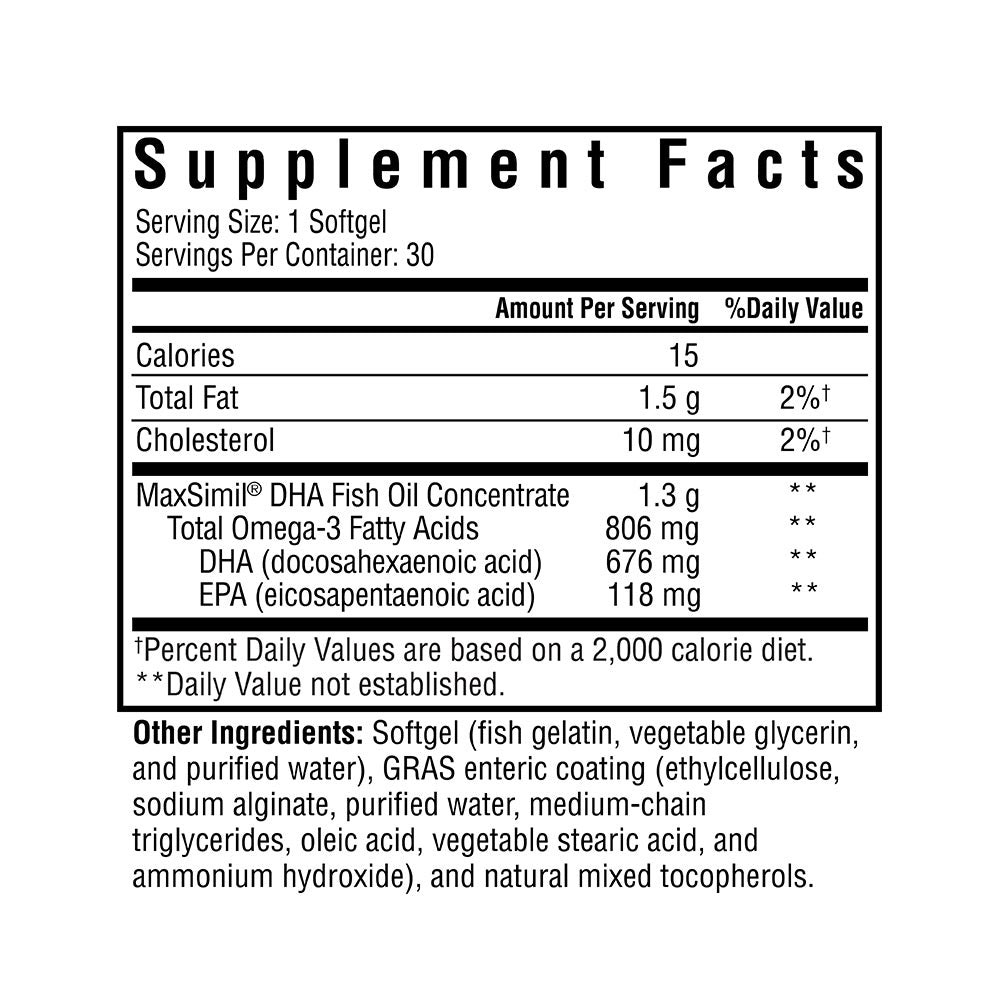No products in the cart.
Seeking Health Optimal DHA
USD $39.95
Optimal DHA Highlights:
- Patented MaxSimil® DHA monoglyceride fish oil. This highly absorbable fish oil is in the monoglyceride form which has been shown to provide better absorption than other types of fish oil such as ethyl ester fish oils.(1)
- IFOS five-star certified. Optimal DHA is certified by IFOS (International Fish Oil Standards) which tests products for the highest quality, safety, and purity standards in the world. IFOS certifies that the amount of omega-3 in the product matches the label, that the fish oil has not gone bad (oxidized), and that the product contains the lowest levels of contaminants.
- The total omega-3 fatty acid content of Optimal DHA is 806 mg per single softgel serving. The source of fish oil comes from anchovies, sardines, and/or mackerel. The amount of DHA per softgel is 676 mg. The amount of EPA per serving is 118 mg.
- The gelatin softgel capsule is made from fish gelatin and is GRAS-certified.
These statements have not been evaluated by the Food and Drug Administration (FDA). This product is not intended to diagnose, treat, cure, or prevent any disease.
Optimal DHA softgels contain 676 mg of concentrated and readily absorbed DHA and 118 mg of EPA per single softgel serving. This highly absorbable monoglyceride fish oil has been shown to provide better absorption than other fish oils.*(1)
The two most well-researched omega-3 polyunsaturated fatty acids (PUFAs) are docosahexaenoic acid (DHA) and eicosapentaenoic acid (EPA). DHA forms essential structural components within the central nervous system, while EPA plays important roles in supporting a healthy cardiovascular system. DHA is the most abundant structural fatty acid in the eyes, brain, and central nervous system and plays important roles in their normal development.*
DHA also plays vital roles in fetal and infant eye, brain, and cognitive health and development. During pregnancy, DHA is transferred from mother to fetus, especially during the last trimester, and after birth via breast milk. DHA-supplemented and breastfed infants score significantly higher on mental, psychomotor, visual, developmental, vocabulary, and IQ tests later in life.*(2,3,4,5,6,7)
Levels of DHA decline with aging and supplementation with DHA may help to support healthy cognition, including memory and vocabulary. Studies have also shown that having higher levels of DHA supports a healthy inflammatory process, normal blood pressure, maintenance of healthy lipid (cholesterol) levels, normal resistance to oxidative stress, as well as contributing to the overall health of the nervous system, cardiovascular system, immune system, brain, eyes, and healthy metabolism.*(2,4,8,9,10,11,12,13,14,15)
SUGGESTED USE:
Take one softgel daily with food, or as directed by your healthcare practitioner.
WARNINGS:
Consult with a qualified healthcare professional prior to use. Individuals taking medication should discuss potential interactions with their healthcare practitioner. Do not use if tamper seal is damaged.
ALLERGY AND DIET INFORMATION:
Optimal DHA capsules are free of wheat, gluten, corn, yeast, soy protein, dairy products, shellfish, peanuts, tree nuts, egg, ingredients derived from GMOs, artificial colors, artificial sweeteners, and artificial preservatives.
Optimal DHA meets or exceeds cGMP Quality Standards.
- Brunet S, Chamoun R, Fortin S, et al. MaxSimil®: A novel, patented natural platform for enhanced absorption of omega-3s. Single dose, double-blind, 2-way crossover pilot pharmacokinetic study on healthy subjects under normal diet. Sherbrooke (Québec), Canada: Ingenutra; 2018.
- Jiao J, Li Q, Chu J, et al. Effect of n-3 PUFA supplementation on cognitive function throughout the life span from infancy to old age: a systematic review and meta-analysis of randomized controlled trials. Am J Clin Nutr. 2014 Dec;100(6):1422-36. [PMID: 25411277]\
- Singh M. Essential fatty acids, DHA and human brain. Indian J Pediatr. 2005 Mar;72(3):239-42. [PMID: 15812120]
- Uauy R, Dangour AD. Nutrition in brain development and aging: role of essential fatty acids. Nutr Rev. 2006 May;64(5 Pt 2):S24-33; discussion S72-91. [PMID: 16770950]
- Drover J, Hoffman DR, Castañeda YS, et al. Three randomized controlled trials of early long-chain polyunsaturated fatty acid supplementation on means-end problem solving in 9-month-olds. Child Dev. 2009 Sep-Oct;80(5):1376-84. [PMID: 19765006]
- Shulkin M, Pimpin L, Bellinger D, et al. n-3 fatty acid supplementation in mothers, preterm infants, and term infants and childhood psychomotor and visual development: a systematic review and meta-analysis. J Nutr. 2018 Mar 1;148(3):409-418. [PMID: 29546296]
- Birch EE, Carlson SE, Hoffman DR, et al. The DIAMOND (DHA intake and measurement of neural development) study: a double-masked, randomized controlled clinical trial of the maturation of infant visual acuity as a function of the dietary level of docosahexaenoic acid. Am J Clin Nutr. 2010 Apr;91(4):848- 59. [PMID: 20130095]
- Lukiw WJ, Bazan NG. Docosahexaenoic acid and the aging brain. J Nutr. 2008 Dec;138(12):2510-4. [PMID: 19022980]
- Cole GM, Ma QL, Frautschy SA. Dietary fatty acids and the aging brain. Nutr Rev. 2010 Dec;68 Suppl 2:S102-11. [PMID: 21091943]
- Bazan NG. Neuroprotectin D1 (NPD1): a DHA-derived mediator that protects brain and retina against cell injury-induced oxidative stress. Brain Pathol. 2005 Apr;15(2):159-66. [PMID: 15912889]
- Ghasemi Fard S, Wang F, Sinclair AJ, et al. How does high DHA fish oil affect health? A systematic review of evidence. Crit Rev Food Sci Nutr. 2018 Mar 1:1-44. [PMID: 29494205]
- Mozaffarian D, Lemaitre RN, King IB, et al. Circulating long-chain ω-3 fatty acids and incidence of congestive heart failure in older adults: the cardiovascular health study: a cohort study. Ann Intern Med. 2011 Aug;155(3):160-70. [PMID: 21810709]
- Grimsgaard S, Bønaa KH, Hansen JB, et al. Effects of highly purified eicosapentaenoic acid and docosahexaenoic acid on monocyte phagocytosis in man.
- FDA Announces New Qualified Health Claims for EPA and DHA Omega-3 Consumption and the Risk of Hypertension and Coronary Heart Disease [update]. Silver Spring, MD: Center for Food Safety and Applied Nutrition Constituent Update, US Food and Drug Administration; June 19, 2019. https://www.fda.gov/food/cfsan-constituent-updates/ fda-announces-new-qualified-health-claims-epa-and-dha-omega-3-consumption-andrisk-hypertension-and. Accessed July 18, 2019.
- Kew S, Mesa MD, Tricon S, et al. Effects of oils rich in eicosapentaenoic and docosahexaenoic acids on immune cell composition and function in healthy humans. Am J Clin Nutr. 2004 Apr;79(4):674-81. [PMID: 15051614]
| Vendor |
|---|
Only logged in customers who have purchased this product may leave a review.



Reviews
There are no reviews yet.